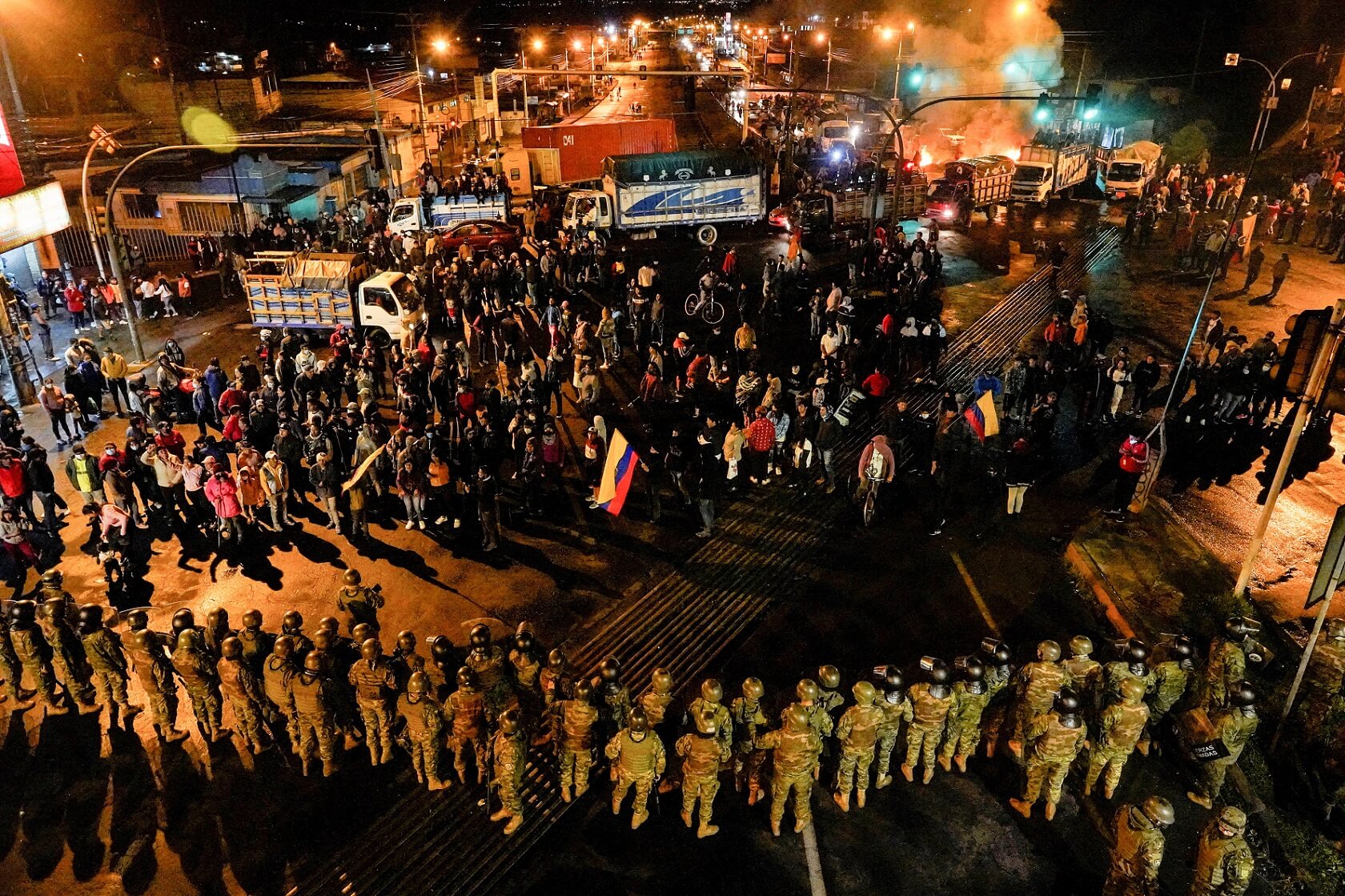Protests in Ecuador intensified on Wednesday as Minister of Government Francisco Jiménez refused the Confederation of Indigenous Nationalities of Ecuador (CONAIE)’s demand to lift the state of emergency, arguing that this would leave Quito “defenceless,” noting that the violence has already “gotten out of hand.”
Jiménez claimed that “sincere dialogue does not admit conditions,” and urged CONAIE leader Leonidas Iza to “give in a little and sit down at the table with the government.”
He stated that there are “urgent national problems to solve and violence is not the way,” pointing to “infiltrators” and “people causing chaos and destruction.”
El ministro @panchojimenezs enfatizó que mientras no cesen los desmanes, agresiones y manifestaciones que ponen en peligro la vida, no se puede derogar el estado de excepción; y que en Quito en el 90 % de situaciones ha intervenido la @PoliciaEcuador. pic.twitter.com/AfXA8MW0UH
— Ministerio de Gobierno Ecuador (@MinGobiernoEc) June 22, 2022
The minister further claimed that the government had already answered CONAIE’s ten demands and argued that this is “not the time” make additional demands, positing that the new “impositions” are putting “the tranquillity of those who want to live and work in unity at risk.”
Jiménez thus called on Iza to “resolve this once and for all with peace, with will and with security,” assuring that there exist “reliable, impartial negotiation mechanisms that allow them to bring [their] positions closer together.”
The minister of government was responding to a letter signed by Iza and other indigenous leaders, who have demanded the removal of the state of emergency, the demilitarisation of Quito, and an end to “repressive actions.” CONAIE has said it wants to speak to the government directly, not through “mediators or intermediaries,” calling for “frontal and direct dialogue.”
Keeping this in mind, CONAIE decided not to attend the negotiations scheduled by the government yesterday, saying Indigenous protesters’ demands “have not been answered for more than a year.”
Hoy se realizó una masiva marcha por los resultados en #Quito, aglutinó el respaldo popular de distintos sectores de la capital. La conciencia colectiva frente a la crisis estructural se impone a la política represiva del Gobierno. #quito #QuitoMerecePaz #ParoNacionalEC pic.twitter.com/mz0sXOuR91
— CONAIE (@CONAIE_Ecuador) June 23, 2022
These developments come against the backdrop of the second death of an Indigenous protester, who was allegedly shot in his face with a tear gas bomb at close range by the police. In total, at least 90 people have been injured and over 87 arrested during the ten consecutive days of demonstrations, with CONAIE denouncing the excessive use of force by the military and the police, which has only increased since the state of emergency was first declared on June 17 and then expanded to three more provinces on Tuesday.
Iza has said the heavy-handed response “has only managed to exacerbate the spirit of the population and generate serious escalations of conflict.”
La @WaoResistencia se pronuncia por la muerte del compañero Byron Guatatuca producto de la represión policial al #ParoNacionalEc2022 y denuncia amenazas contra la presidenta de la OWAP, Silvana Nihua.#CIDHesUrgenteEc @CIDH @esmeraldatroiti @RELE_CIDH@ONU_es @TaniaReneaum👇 https://t.co/AATgvzYZ5f
— CONAIE (@CONAIE_Ecuador) June 23, 2022
Interior Minister Patricio Carrillo has blamed the violence on “radical” members of the Kichwa and Shuar indigenous communities, who he said have launched “absolutely irrational” attacks against the police. Six police officers have been injured so far; furthermore, 18 officers are missing.
To this end, Carillo has said, “We cannot guarantee public safety in Puyo right now – they have burned the entire police infrastructure and the entrance to the city is under siege.”
Similarly, Defence Minister Luis Lara has warned, “The armed forces will not allow constitutional order to be broken or any action against democracy and the laws of the republic.”
Ayer, el #Puyo llegó al límite, sin embargo, @PoliciaEcuador no se va agotar y va a reaccionar de manera resiliente para servir a la ciudad y a la provincia. Los servidores policiales jamás abandonarán su vocación de servicio.#EcuadorQuierePaz https://t.co/sQktn4vBKD
— Patricio Carrillo (@CarrilloRosero) June 23, 2022
There have also been attacks on the attorney general’s office; several roads have been blocked and public transport has been affected as well. This has led to food and fuel shortages. In fact, it is estimated that the protests have cut oil production by around 189,000 barrels.
Protests first broke out on June 13 over high fuel prices, though it has now morphed into a larger movement. Up to 10,000 people are believed to have participated in Wednesday’s protests, with Indigenous citizens rallying against President Guillermo Lasso’s economic policies due to high inflation, unemployment, and poverty.
El desabastecimiento, las familias con hambre y el freno a la reactivación son las verdaderas consecuencias del caos en el Ecuador. Los violentos han reprimido a su propia comunidad, los enfrentamientos deben parar, #EcuadorQuierePaz. pic.twitter.com/5Src1g2vF5
— Guillermo Lasso (@LassoGuillermo) June 22, 2022
Protesters have presented a set of ten demands to the government, including debt relief for the poor families, reduced food and fuel prices to address the rising cost of living, and prevent the further expansion of the country’s oil and mining industry.
President Guillermo Lasso has attempted to resolve protesters’ frustrations by freezing diesel prices at $1.90. He also announced a 50% increase in fertiliser subsidies for small farmers, improved support for vulnerable and poor families, and loan waivers worth up to $3,000. However, this has done little to quell the protests.

